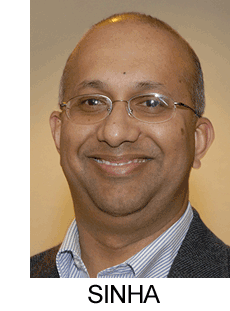 Satrajit Sinha knew achieving continuing appointment would be a long, arduous journey filled with potential pitfalls and roadblocks. So Sinha did what many of his colleagues often don’t know they can do — he turned to his union for guidance.
Satrajit Sinha knew achieving continuing appointment would be a long, arduous journey filled with potential pitfalls and roadblocks. So Sinha did what many of his colleagues often don’t know they can do — he turned to his union for guidance.
“UUP was very helpful,†said Sinha, an associate professor of biochemistry at Buffalo HSC, who was granted continuing appointment effective in September. “The union allowed me to understand how the system works and made it possible for me to network with faculty who had gone through the tenure process.â€
Sinha also took advantage of a negotiated Joint Labor/Management Committees grant, which lent him the financial support necessary to attend a scientific meeting at the beginning of his SUNY career. These meetings not only offer professional development, they are a necessary step to presenting papers and developing peer relationships that may well be the cornerstones to achieving continuing appointment.
“Tenure is a very important part of a person’s professional life,†Sinha said. “If one day you realize you are up for tenure and you haven’t begun preparing documents, then it may very well be too late. It’s not like you can keep trying again and again and again.â€
Sinha is one of dozens of UUP members each year who are eligible for continuing appointment, as tenure is known at SUNY. Based on a full professional obligation, the review process involves three key components: research, teaching and service. Though criteria differ among campuses, candidates for tenure must attain
positive reviews from campus-based tenure committees, departmental chairs, deans or provosts, and be recommended by their college presidents for approval by the chancellor — all prior to the end of the academic employee’s sixth consecutive year of employment.
UUP Vice President for Academics Frederick Floss said the difficulty of achieving tenure within a specific timeframe is accentuated by the lack of uniform standards or procedures for attaining continuing appointment at SUNY. “Each campus, and sometimes each department, has its own policies and procedures, so it’s vital new faculty familiarize themselves with these local criteria,†he said.
A member’s accumulating “tenure file†should receive regular updates of materials, such as teaching evaluations, committee appointments and other service work, publications and “anything else that might prove valuable down the road,†Floss said. He also strongly recommends academic employees familiarize themselves with the Policies of the SUNY Board of Trustees and take advantage of what their UUP chapter has to offer.
In addition to peer mentoring programs and negotiated professional development grants, several UUP chapters hold periodic workshops to assist academic employees on the process and to spell out exactly what is expected at their campus.
Ivan Steen, UUP chapter vice president for academics at UAlbany, has helped to organize dozens of union-sponsored tenure workshops over the years, including one held last month.
“The tenure process can be a tough time for people and that’s why we think these workshops are helpful,†Steen said. “We like people to know that the union is concerned for them and willing to help them move forward in their academic careers.â€
The Albany Chapter workshops typically include a member or former member of the College Tenure Committee and the campus Senate Council on Promotion and Continuing Appointment, and a department chair.
The Buffalo State Chapter workshop set for later this month will include presentations by a tenured faculty member, a professor emeritus, a former provost and a NYSUT labor relations specialist assigned to UUP.
“We bring together folks who can talk plainly and who can give faculty a sense of what works,†Steen said. Faculty learn from committee, council and panel reviewers which of their credentials will have the greatest impact. “The faculty get this data firsthand from those who sit in judgment,†Steen added.
Oswego UUP Chapter President Charles Spector said he “tells new faculty to check with their department chair as to the expectations of the work, to get everything in writing, and to do what’s expected of them.†Oswego’s October promotions and tenure workshop included effective ways for faculty to prepare documentation and present their case for review.
“Tenure is all about how to put your best foot forward, though you still have to do the work,†Steen said. “Theoretically, there are three things that are supposed to be equal — research, teaching and service. But, in practice, we know that isn’t always the case. We tell people that, at a university center, research is often weighed more heavily than the teaching and service components.â€
Some faculty can get caught up in their day-to-day work and fail to properly accumulate and prepare their dossiers — potentially fatal mistakes that could send a candidate packing.
“The toughest parts for most faculty is time management and figuring out their priorities,†Sinha said. “Faculty must be proactive. It is critical to get input from others who have gone through the tenure process and to not be afraid to ask questions.â€
Sinha recognizes the value of UUP to the process, and promises to share what he’s learned with others.
“In my department, we’re starting an informal mentoring program so the next generation of faculty will be paired up with someone like me, who has gone through the tenure process,†he said. “Faculty need to be well-rounded to achieve tenure. I will tell people to prepare as early as possible, to talk to tenured faculty, and to make sure they understand what the expectations are.
“I don’t want faculty to feel they’re alone in this process.â€
— Karen L. Mattison
(Editor’s note: The Voice will tackle the challenges of permanent appointment for professionals in a future issue.)

